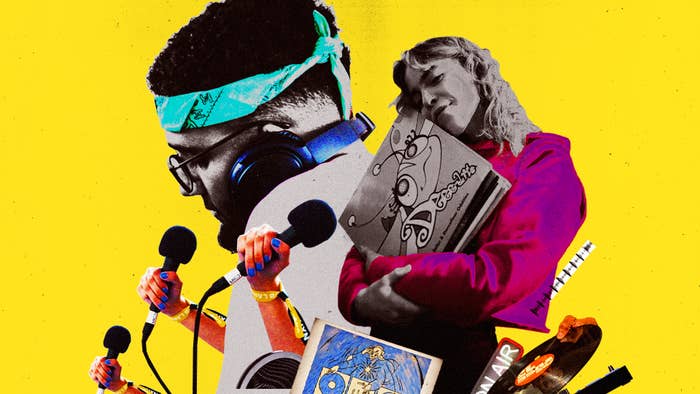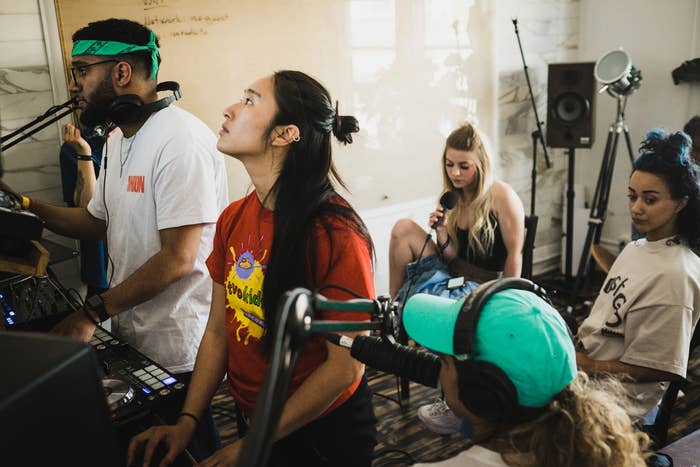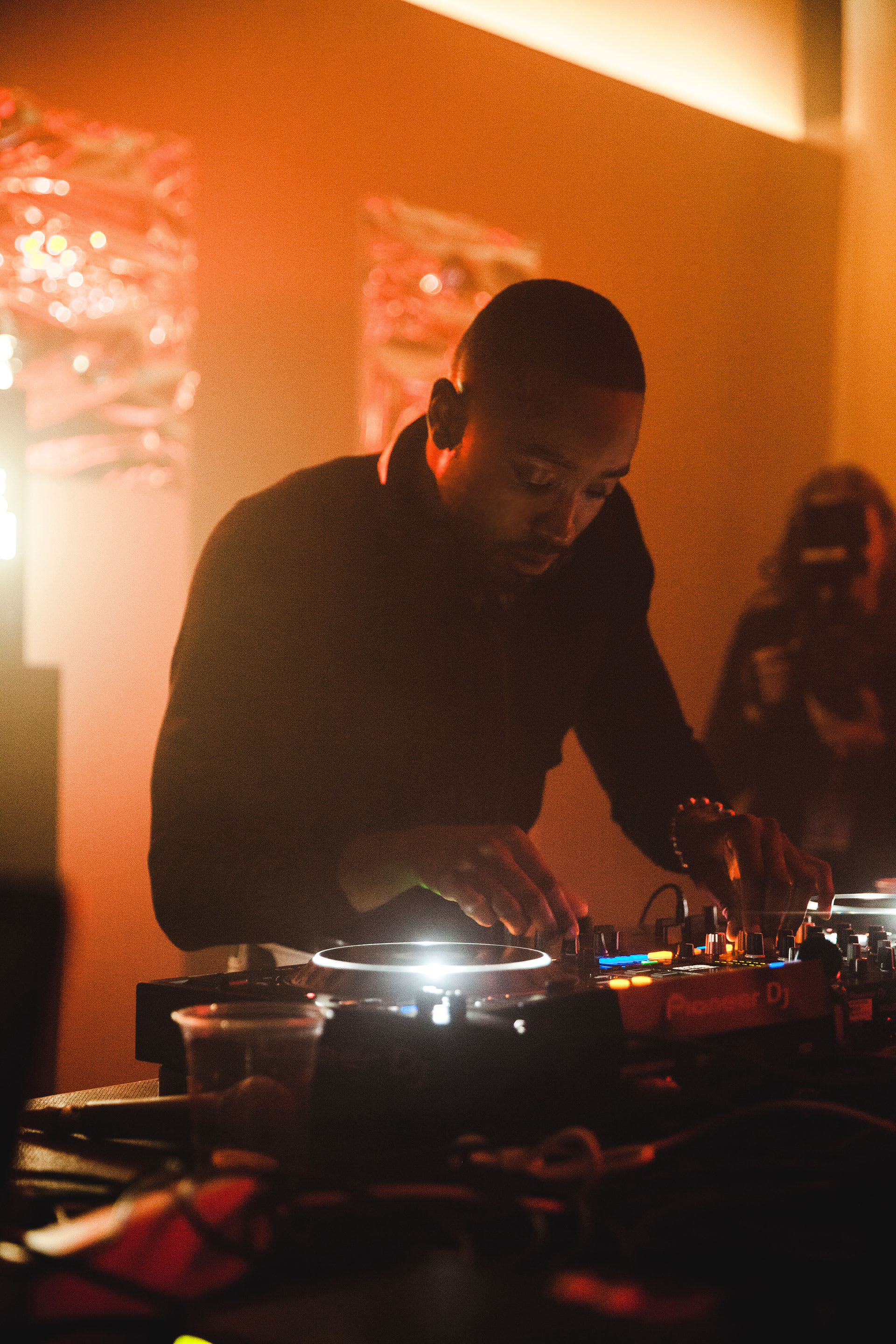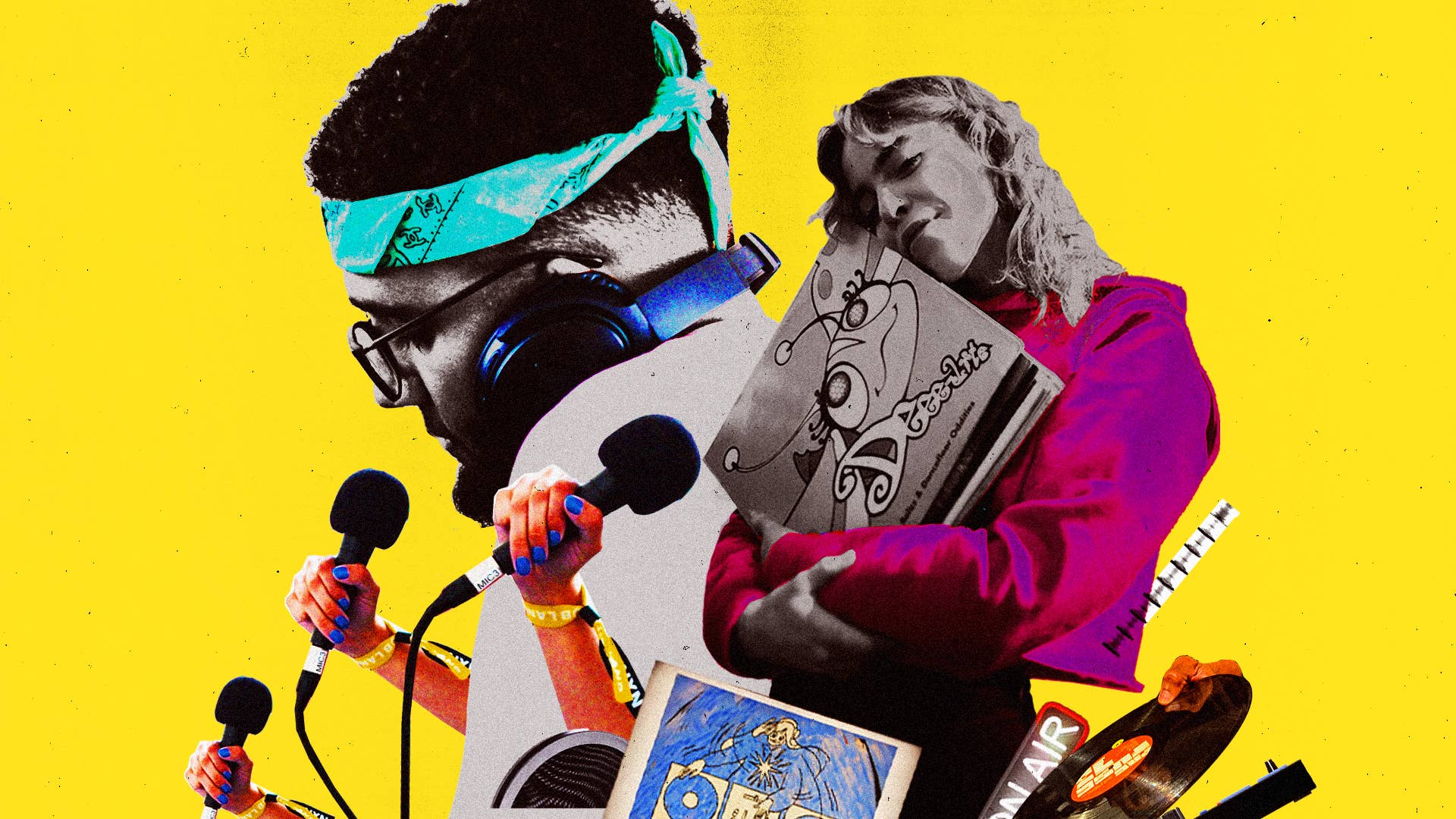
Casually perusing the Mixcloud archives of Montreal-based n10as radio is akin to stumbling on a hidden treasure trove. Scintillatingly alluring, you can get lost for hours listening to episodes devoted to niche genres like chopped and screwed hip-hop, future soul, and psych rock. Currently Canada’s longest running online radio station, a mighty crew has kept it going since February 2016.
The ubiquity of online radios stations like Dublab in Los Angeles, Berlin Community Radio, NTS in London, and TRP in Toronto inspired them to launch their own in Montreal.
Online radio is an inherently DIY endeavour. Without the developed infrastructure of national broadcasters and radio stations, much of the work lies in getting the station off the ground and keeping it running. These stations tend to put community over profit, they don’t sell ads, and allow for complete freedom in programming. They’re not run out of glitzy, sound-proofed studios—sometimes at Toronto-based ISO Radio, you can hear cars whooshing past from below on Yonge Street. The makeshift studios become meeting grounds, places of discovery birthing new collectives and ideas.
Michelle da Silva’s ISO radio show Early Bird Special is a prime example of online radio as a platform for discovery. The Toronto journalist invites experts and enthusiasts to talk about lesser-known subgenres that they’re super passionate about. On one episode, Laura Schütte, who DJs as Milch, went in on her love for Italo Disco. “She probably wouldn't have that many other platforms readily available for her to talk about that genre and play that kind of music,” said da Silva.

Both n10as and ISO are maintained with the help of spirited volunteers who handle programming, archiving, and day-to-day management. The airwaves are filled by ever-growing rosters of DJs and hosts, from veterans like Basic Soul Unit and Jason Ulrich at ISO to brand new DJs just getting their feet wet and reveling in indispensable access to CDJs and all the expensive mixing equipment.
Independent radio stations are collective labours of love. Mason Windels, a founding member of n10as, calls it a “continuous work in progress.” Launching online radio stations across Canada has been a notoriously precarious undertaking. ISO typically broadcasts 40 to 50 shows a month; n10as typically broadcasts 40 hours of new programs every week—the upkeep is constant.
"It really is for the culture, for the community. It's not a money-making endeavour." - Josephine Cruz
In late 2014, when the Toronto Radio Project (TRP) launched, it satiated the desires of discerning listeners across the country wanting to hear more left-field music genres. It went on to win an award for Best Online Radio in the USA and Canada at the 2015 International Radio Festival in Zurich. In August 2016 it went on hiatus, the founder Frazer Lavender telling blogTO at the time that: "the simple reason is money—lack thereof. City Beat [the record store they shared the space with] is closing down and we can't swallow the extra rent.”
Other online radios have met similar fates, including No Fun Radio and an n10as offshoot in Vancouver, which lost its home when the record store it was in got renovicted in 2017.
“It's a testament to the challenge of doing something like this. It's hard to execute. It's hard to keep it going. It's hard to figure out how to pay for it,” said Josephine Cruz, who co-founded ISO with producer and DJ Freeza Chin. "It really is for the culture, for the community. It's not a money-making endeavour."
Cruz, who is known as a fixture in Toronto’s dance music scene as DJ Jayemkayem, used $10,000 of her own savings for gear, to build the site and to pay rent for the first four months. She spent 10 months looking for a space and once everything was finalized they went live in January 2019.
“Our expenses are quite low. One thing that I knew early on was, if this is going to have any chance of sustaining, it needs to be as cheap as possible.”
The cost of rent and a profitless business model were already an issue and then came the COVID-19 pandemic. ISO covered their first year of rent through activations with RedBull, Mural Festival, Stackt, and NXNE, but that type of events-based funding may be nonexistent for a while as social distancing measures are extended. Luckily, their landlord, Toronto coffee chain Boxcar Social, put their rent on hold indefinitely since March. Now, they’re gearing up to reopen in mid-July. Over in Montreal, n10as is run out of the Arbutus Records building, a multi-use creative hub. Sebastian Cowan, the owner of Arbutus is a founding member of the station.
But, not being able to broadcast out of their respective spaces poses other challenges. Both n10as and ISO are collecting donations through PayPal to help with overhead costs and to assist their extended families of volunteers and hosts, who are largely out-of-work due to the pandemic stifling the nightlife industry. To continue providing a platform for engaging and unexpected music, they’ve had to pivot from live in-studio broadcasts to airing pre-recorded mixes sent in by their usual hosts as well as rebroadcasting old mixes. Some DJs have been going live from home, like Atina Chaikith for ISO.
"A lot of local DJs need a platform to reach an audience outside of Toronto. It's really challenging as an artist here because there's not that much support." - Karim Olen Ash
At n10as, a dip in regular hosts being able to fill their time slots followed the widespread COVID-19 shutdowns. "I think that adjustment and how hard it hit everybody was a lot for people to deal with," said Windels.
However, new DJs and producers from abroad and closer to home have helped fill that void by sending in guest mixes. That coupled with more people at home tuning in has created an oddly opportune circumstance for inter-community connections. Over the past two months, guest mixes from Latvia, Amsterdam, London, and New Zealand have graced n10as and ISO, evidence of the “think global, act local” ethos of both stations.
The foundations they’ve built will likely see them outlast the pandemic—they mean too much to so many people. There is a deep well of musical talent in this country that flies under the mainstream radar and platforms that play that music are crucial. “A lot of local DJs need a platform to reach an audience outside of Toronto. It's really challenging as an artist here because there's not that much support. ISO is like an international bridge to places in Europe and the States,” said Karim Olen Ash, a DJ who runs a queer POC-centred party series called Pep Rally with Chippy Nonstop. Their corresponding radio show is on hiatus during the pandemic.

After TRP shut down in 2016, Windels realized n10as was the only online radio in Canada, which is why he made a concerted effort to expand to Vancouver. He says it felt like “the balance was restored,” when ISO launched.
Internet radio was integral to Cruz’s musical development growing up in Calgary. “It was a window to another world and helped form my music taste. I liked that radio could offer a snapshot of a place at a certain time in history. When I would listen to Rinse FM in the mid-2000s, it was very indicative of what was happening in London musically, culturally, socially, politically, everything.” To be able to archive moments like that for Toronto culture is one of her goals for ISO.
Community-led radio helps to bridge gaps between the stratified subsets of Montreal and Toronto’s music scenes by bringing them into conversation with each other. On any given day, you can hear a nasty grime set, some free jazz, and end the night off with some disco, eschewing the rigid parameters of genre. Aïsha Vertus, whose radio show Witches’ Brew has been running on n10as since the week they launched, says “it builds a community that is larger than just the hip-hop heads or the techno raver kids. All these people are under the same roof of underground music. It makes the scene wider and stronger.”
Katie Lavoie, a DJ who has played for a number of stations across North America, feels similarly about radio in Toronto. “I think that Toronto can be pretty segregated musically. Everybody should be playing tons of different kinds of shows and that's what radio really helps with, especially ISO and Invisible City[a record label, store, and DJ sound system that hosts live streams].”
Another resounding similarity across the cities is that the people hosting these online radio stations would love to see more pop up. Historically, anything rooted in community perseveres even when it has to adapt. Beyond COVID-19 and restrictive rent and difficulty getting funding, the underground always seems to find a way.
The legacy of these stations will go beyond the stations themselves—already n10as alumni have booked residencies and festival gigs off the strength of their shows. “I recognize so many names of people who have been part of our community popping up on lineups. For some, their first time DJing was with us and it’s really nice to see people grow in that way,” said Windels.

